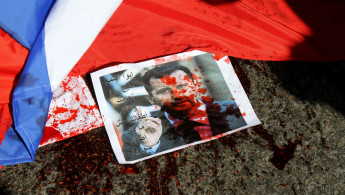France issues arrest warrants for senior Assad regime officials
The warrants, which target National Security Bureau director Ali Mamluk and two others, were issued for "complicity in acts of torture", "complicity in crimes against humanity" and "complicity in war crimes".
Mamluk is one of Syrian President Bashar al-Assad's most senior advisers.
The warrants were issued on 8 October but made public only on Monday, according to the International Federation for Human Rights advocacy group (FIDH).
The other high-ranking officials sought are Jamil Hassan, head of the Syrian air force's intelligence agency, and Abdel Salam Mahmoud, in charge of the air force intelligence's investigative branch at the Mezzeh military airport in Damascus.
They are wanted in connection with the disappearance of Mazen and Patrick Dabbagh, a father and son, who were arrested in November 2013 and went missing after being detained in the Mezzeh detention centre, according to the FIDH.
Twitter Post
|
The Assad regime confirmed in August 2018 that both Mazen and Patrick were dead.
"These arrest warrants for three senior officials, including a top adviser to President Bashar al-Assad, are an important step towards delivering justice for the countless victims of gross human rights violations carried out by the Syrian government," Amnesty International said in a statement.
"The international community should follow France's lead by taking steps, wherever possible, to end impunity in the Syria conflict and hold all parties to account."
Germany, which has universal jurisdiction over war crimes, issued an arrest warrant in June for air force official Jamil Hassan.
Efforts to prosecute members of the Assad regime have repeatedly failed because Syria is not a signatory of the Rome Statute of the International Criminal Court (ICC) in the Hague.
Russia and China have vetoed attempts to give the ICC a mandate to set up a special tribunal for Syria.
The Syrian conflict began in 2011 when President Bashar al-Assad responded with military force to peaceful protests demanding democratic reforms during the Arab Spring wave of uprisings, triggering an armed rebellion.
Hundreds of thousands of civilians have been killed in the war, mostly by the regime and its powerful allies, and millions have been displaced both inside and outside of Syria.
The brutal tactics pursued mainly by the regime, which have included the use of chemical weapons, sieges, mass executions and torture against civilians have led to war crimes investigations.





 Follow the Middle East's top stories in English at The New Arab on Google News
Follow the Middle East's top stories in English at The New Arab on Google News
![Israeli forces ordered bombed Gaza's Jabalia, ordering residents to leave [Getty]](/sites/default/files/styles/image_330x185/public/2176418030.jpeg?h=a5f2f23a&itok=_YGZaP1z)

